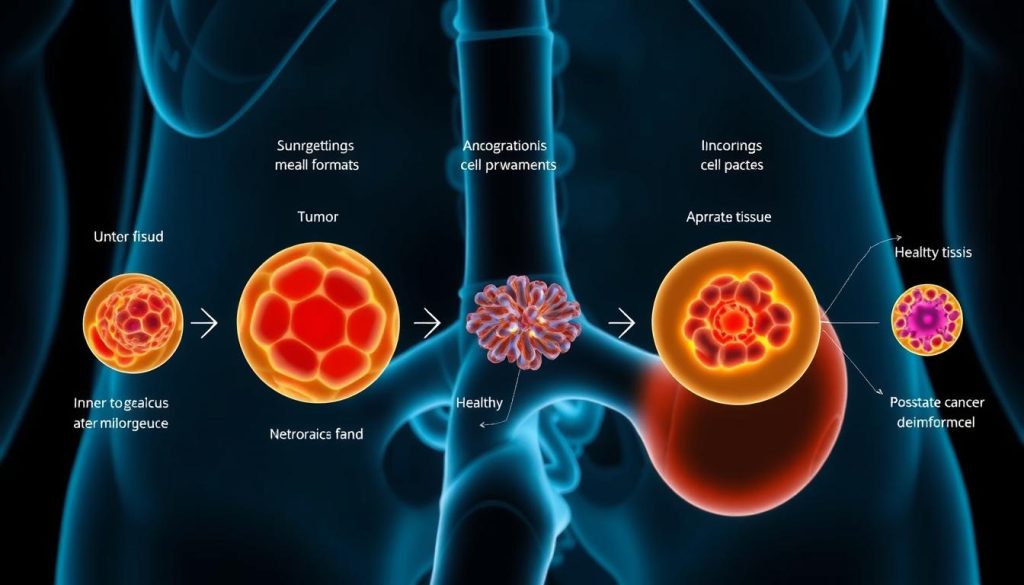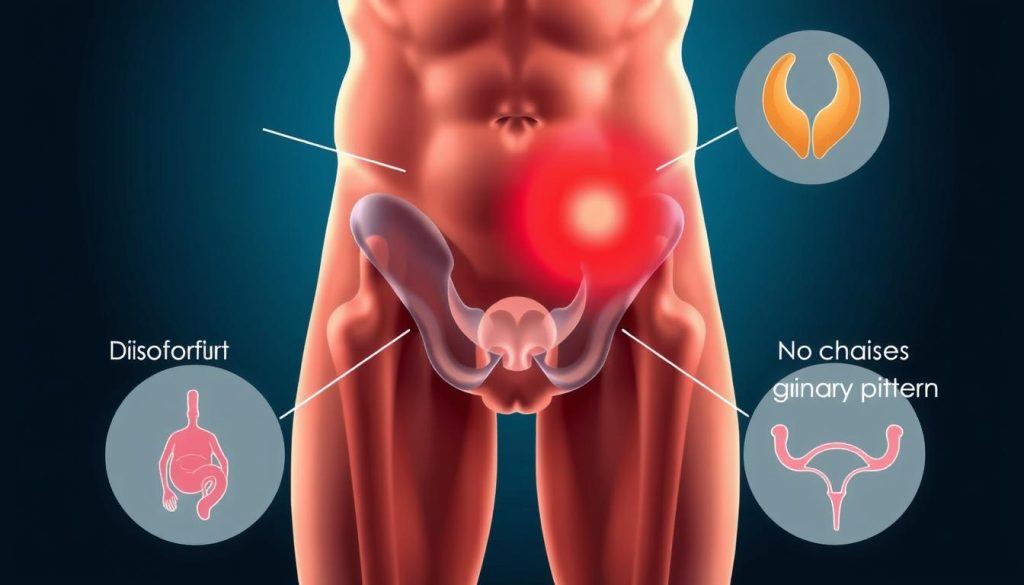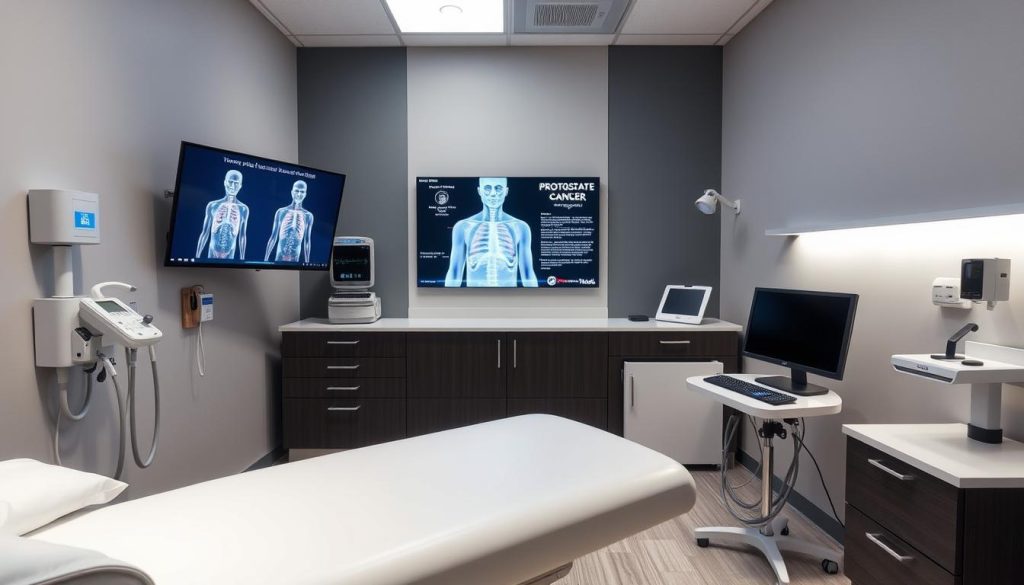Prostate cancer is a serious health issue that affects many men globally. It’s important to know the symptoms, risk factors, and screening methods. This helps in early detection and effective treatment. We’ll look into the key aspects of prostate cancer, offering insights on warning signs and risk.
We’ll cover the basics of prostate cancer, including its development and the prostate gland’s role. You’ll learn about early warning signs and risk factors. By the end, you’ll understand prostate cancer well and know how to protect your health.
Understanding Prostate Cancer Fundamentals
Prostate cancer is a serious health concern for men. Knowing the basics can help you spot signs early and take action. Let’s dive into what prostate cancer is and how it affects your body.
What Is Prostate Cancer and How It Develops
Prostate cancer starts when cells in the prostate gland grow out of control. These cells can form tumors and spread to other parts of the body. Understanding how to get prostate cancer involves looking at risk factors like age, family history, and lifestyle choices.

The Role of the Prostate Gland
The prostate is a small gland in men that makes fluid for semen. It sits below the bladder and surrounds the urethra. When cancer forms here, it can cause problems with urination and sexual function.
Common Types of Prostate Cancer
Most prostate cancers are adenocarcinomas, which start in gland cells. Rare types include small cell carcinoma and neuroendocrine tumors. As the disease progresses, doctors use prostate cancer stages to describe its spread:
- Stage 1: Cancer is small and only in the prostate
- Stage 2: Cancer is larger but still contained in the prostate
- Stage 3: Cancer has spread outside the prostate
- Stage 4: Cancer has spread to distant parts of the body
Knowing these stages helps doctors plan the best treatment. Early detection is key in fighting prostate cancer, so regular check-ups are important for men as they age.
Early Warning Signs and Symptoms to Watch For
Spotting prostate cancer symptoms early is key to better treatment. Men should know the signs and get prostate cancer screening as part of their health check-ups.

Urinary Changes and Related Symptoms
Urinary habits changes are often the first signs of prostate issues. These can include:
- Frequent urination, especially at night
- Difficulty starting or stopping urine flow
- Weak or interrupted urine stream
- Urgency to urinate
If you notice these symptoms often, see a doctor. Early detection through proper screening can greatly improve treatment results.
Physical Discomfort and Pain Indicators
Prostate cancer can cause discomfort in different areas:
- Pelvic pain or pressure
- Lower back pain
- Pain in the hips or upper thighs
These symptoms might start off mild but can get worse. Don’t ignore ongoing pain, as it could signal a serious issue.
Sexual Function Changes
Changes in sexual function can also be signs of prostate cancer:
- Difficulty achieving or maintaining an erection
- Pain during ejaculation
- Blood in semen
While these changes can be hard to talk about, it’s crucial to discuss them with a doctor. Regular check-ups and talking openly about symptoms are vital for early detection and effective treatment of prostate cancer.
| Symptom Category | Common Signs | Action Required |
|---|---|---|
| Urinary Changes | Frequent urination, weak stream | Consult doctor, consider screening |
| Physical Discomfort | Pelvic pain, lower back pain | Seek medical evaluation |
| Sexual Function | Erectile issues, pain during ejaculation | Discuss with healthcare provider |
How to Get Prostate Cancer: Key Risk Factors
Knowing about prostate cancer risk factors is key to catching it early and preventing it. Some risks we can’t change, but we can manage others through our lifestyle.
Age is a big factor in getting prostate cancer. Men over 50 are more at risk, and the risk grows with age. Family history also matters. If your relatives had prostate cancer, you’re more likely to get it too.
Being of certain races or ethnicities can also raise your risk. African American men, for example, face a higher risk than others. Scientists are still trying to figure out why this is to find better ways to screen and prevent it.
What you eat and how active you are can also affect your prostate health. Eating a lot of red meat and dairy might increase your risk. But eating more fruits and veggies and staying active can help. Keeping a healthy weight is also important.
“Knowledge is power. Understanding your risk factors empowers you to take control of your prostate health.”
Some environmental factors might also play a part in getting prostate cancer. If you work with chemicals like pesticides or heavy metals, you should watch your health closely.
| Risk Factor | Impact Level | Modifiable |
|---|---|---|
| Age | High | No |
| Family History | Moderate to High | No |
| Race/Ethnicity | Moderate | No |
| Diet | Low to Moderate | Yes |
| Physical Activity | Low to Moderate | Yes |
By knowing these risk factors, men can make better choices about screening and lifestyle changes. Regular check-ups and talking to your doctor are important steps in preventing prostate cancer.
Prevention Strategies and Risk Reduction
There’s no surefire way to stop prostate cancer, but some lifestyle choices can help. Eating right and staying active are key. A diet full of fruits, veggies, and whole grains is good for your prostate. Try to eat less red meat and dairy, as they might increase cancer risk.
Dietary Modifications for Prevention
Eat foods packed with antioxidants like tomatoes, berries, and leafy greens. They can shield your cells. Omega-3s in fish fight inflammation. Green tea and coffee might also help, but eat them in moderation.
Lifestyle Changes That Matter
Exercise regularly to boost your health and possibly lower cancer risk. Aim for 30 minutes of moderate activity daily. Keeping a healthy weight is also important, as being overweight can lead to aggressive cancer. Quit smoking and drink less alcohol to reduce your risk too.
Preventive Medical Interventions
Talk to your doctor about screening for prostate cancer. Regular checks can catch cancer early, improving your chances. Some treatments might be used to prevent cancer in people at high risk. Keep up with the latest research for new ways to prevent prostate cancer.
FAQ
Q: What are the early warning signs of prostate cancer?
A: Signs of prostate cancer include needing to urinate often, trouble starting or stopping urination, and a weak urine flow. You might also see blood in urine or semen, have trouble getting an erection, or feel pain in your pelvis. But remember, these symptoms can also mean other health issues. Always talk to a doctor to find out for sure.
Q: Who is at higher risk for developing prostate cancer?
A: Some men are more likely to get prostate cancer. This includes men over 50, African Americans, and those with a family history of it. Being overweight or eating a lot of red meat and dairy can also up your risk.
Q: How is prostate cancer typically diagnosed?
A: Doctors use several tests to find prostate cancer. These include a digital rectal exam (DRE), a blood test for prostate-specific antigen (PSA), and imaging like MRI. If these tests show cancer, a biopsy might be needed to confirm it.
Q: What are the stages of prostate cancer?
A: Prostate cancer is divided into four stages. Stage I is early and the cancer is only in the prostate. Stage II is more advanced but still in the prostate. Stage III means the cancer has spread outside the prostate. Stage IV is when it has spread to other parts of the body. Knowing the stage helps doctors choose the best treatment.
Q: Can prostate cancer be prevented?
A: There’s no surefire way to prevent prostate cancer, but some habits can help. Eating well, staying active, keeping a healthy weight, and drinking less alcohol are good choices. Some studies suggest certain medicines might also help, but more research is needed.
Q: What are the current treatment options for prostate cancer?
A: There are several ways to treat prostate cancer. Options include active surveillance, surgery, radiation, hormone therapy, chemotherapy, and immunotherapy. The right treatment depends on the cancer’s stage, your health, and what you prefer.
Q: How often should men be screened for prostate cancer?
A: How often to get screened depends on your risk. Generally, men should talk to their doctor about screening at 50. If you’re at higher risk, you might need to start earlier, like 45 or 40.
Q: What are the latest advancements in prostate cancer research?
A: New research is bringing better ways to find and treat prostate cancer. This includes better imaging, targeted therapies, immunotherapy, and new surgical methods. Scientists are also looking into new biomarkers for better diagnosis and treatment plans.


















